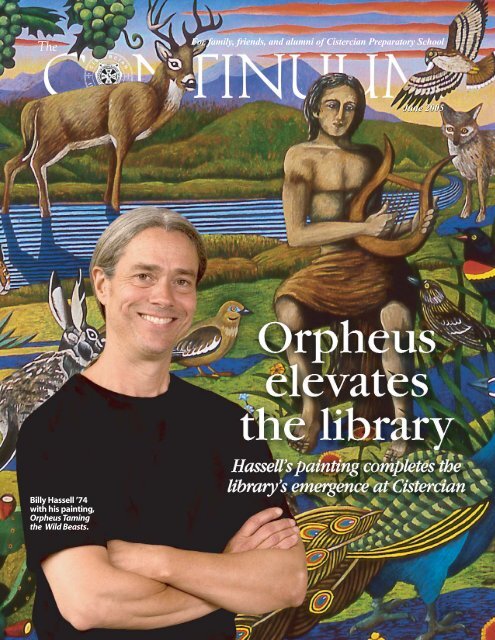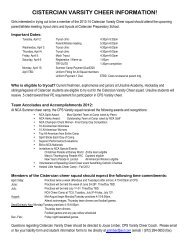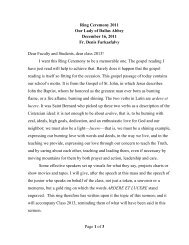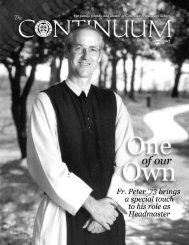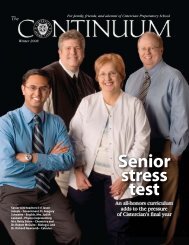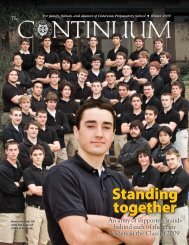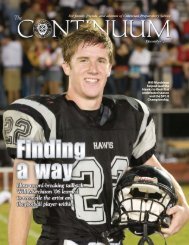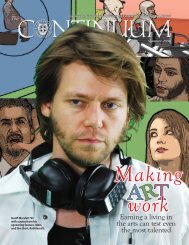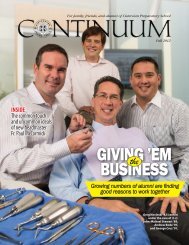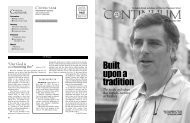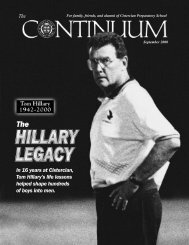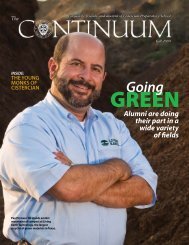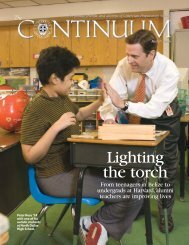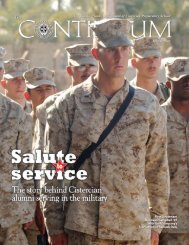June 2005 - Cistercian Preparatory School
June 2005 - Cistercian Preparatory School
June 2005 - Cistercian Preparatory School
Create successful ePaper yourself
Turn your PDF publications into a flip-book with our unique Google optimized e-Paper software.
TheFor family, friends, and alumni of <strong>Cistercian</strong> <strong>Preparatory</strong> <strong>School</strong><strong>June</strong> <strong>2005</strong>Billy Hassell ’74with his painting,Orpheus Tamingthe Wild Beasts.
The Memorare Society was established for members of our communitywho wish to include <strong>Cistercian</strong> in their financial plans throughbequests, trusts, wills, or other means. It’s a wonderful way for peopleto include the school as part of their long-term financial planning.As a member of the Memorare Society, you’ll enable us to continueeducating <strong>Cistercian</strong> students and the Abbey’s young monksfor many years. All while ensuring your legacy with <strong>Cistercian</strong> forgenerations to come. After all, Memorare means “remember.”To find out if the Memorare Society is right for you and your family,simply contact Jennifer Rotter in the Development Office today.All enquiries are welcome. Call 469-499-5406, or send an emailto jrotter@cistercian.org.2 The CONTINUUM
CISTERCIANPREPARATORYSCHOOLRev. Peter Verhalen ’73HeadmasterRev. Bernard MartonAssistant Headmaster,College CounselorGreg Novinski ’82Dean of StudentsRobert J. HaaserDirector of AdmissionsJennifer RotterDirector of Developmentand Alumni RelationsDan LeeDirector of AthleticsMatthew K. Hawkins ’88President, <strong>Cistercian</strong>Alumni Association<strong>School</strong> BoardRt. Rev. Denis FarkasfalvyRev. Robert MaguireRev. Bernard MartonRev. Henry MartonRev. Benedict MonostoriRev. Peter Verhalen ’73David C. HaleyJames J. HartnettDr. Robert J. HendersonJames M. Moroney III ’74Peter P. Smith ’74Jere W.Thompson, Jr. ’74The CONTINUUMDavid Stewart ’74Editor & Art DirectorTom B. PruitCopy EditorSally L.CookAssistant Copy EditorJim ReischPhotography EditorThe CONTINUUM ispublished three times a year(December, March, and <strong>June</strong>) by<strong>Cistercian</strong> <strong>Preparatory</strong> <strong>School</strong>.P.O. Box 140699Irving,TX 75014-0699469-499-5400www.cistercian.orgDonors, myths, popes and mentorsTraditions are inextricably woven into our lives at <strong>Cistercian</strong>The events in Rome over the last few monthshave reminded us, and the entire world, howmuch we long for tradition. People of all faiths followedthe elaborate ceremonies surrounding thedeath of Pope John Paul IIand the election of his successor.This edition of TheContinuum focuses on anumber of traditions that arecrucial to <strong>Cistercian</strong>.In our cover story, Dr.Tom Pruit explores how thetradition of giving played aLetter fromthe HeadmasterFr. PeterVerhalen ’73key role in the developmentof the <strong>Cistercian</strong> library. Byleaving <strong>Cistercian</strong> in herwill, Justine Abernathy dramaticallyimproved thelibrary experience for generations of <strong>Cistercian</strong> students.We also offer some insights on the library’snew painting, Orpheus Taming the Wild Beasts.Artist Billy Hassell ’74 tells of his research into themyth of Orpheus and the impact of the myth on theChristian tradition. Orpheus came to stand for allvolume 32, number 3departments<strong>School</strong> News . . . . . . . . . . . . . . . . . . . . . . . . . . . 4Sports News . . . . . . . . . . . . . . . . . . . . . . . . . . 16Class Notes . . . . . . . . . . . . . . . . . . . . . . . . . . . 17On Prayer by Fr. Roch Kereszty . . . . . . . . . . . . . 19Afterthoughts by Smokey Briggs . . . . . . . . . . . . 20Calendar . . . . . . . . . . . . . . . . . . . . . . . . . . . . . . 20Cover photography: Jim Reischthat tames and ennobles the human being and symbolizesChrist himself who — as the ultimate pedagogue— leads his disciples into the fullness oftheir humanity.We also present two stories that touch on traditionsat the heart of the abbey. David Stewart ’74reveals how <strong>Cistercian</strong> monks and novices viewPope John Paul’s impact on the consecrated life. Ithink you’ll find Br. Joseph Van House’s commentsparticularly interesting. And in his column, Fr. RochKereszty suggests that Pope Benedict XVI maybegin to foster in a new way the tradition of Westernculture and Benedictine monasticism.Finally, I would like to draw your attention to thebrief story on the Hillary Award (page 5). CoachHillary taught so many so much. This awardreminds us to continue the tradition of passing on thelessons we learn from our mentors.As the <strong>Cistercian</strong> Abbey approaches its 50thanniversary, it is only appropriate that we celebratesome of the many rich traditions that make<strong>Cistercian</strong> so special.Please enjoy this edition. I hope it furthers TheContinuum’s tradition of publishing meaninfulreflections for the <strong>Cistercian</strong> Community.in this issueAttaining itsrightful station 8<strong>Cistercian</strong>’s library startedin a make-shift classroom.The addition of Billy Hassell’sOrpheus Taming the Wild Beastshighlights the library’s emergenceas a <strong>Cistercian</strong> showplace.Old andyoungalike 14Members of theabbey reflecton the impactof John Paul II.<strong>Cistercian</strong> <strong>Preparatory</strong> <strong>School</strong> was founded with the aim of preparing talented boys for the colleges of their choice bychallenging their minds with excellent academic programs, molding their character through the values of Catholiceducation, and offering them guidance with both understanding and discipline. <strong>Cistercian</strong> <strong>Preparatory</strong> <strong>School</strong> does notdiscriminate on the basis of race, color, national or ethnic origin in the administration of its educational practices, admissions,scholarship programs, and athletic and other school administered programs.<strong>June</strong> <strong>2005</strong> 3
cistercian newsAthletic banquetHeard winsnew, improvedHillary AwardAt May’s Upper <strong>School</strong>Athletic Banquet, the climacticmoment came when Fr. PeterVerhalen ’73 presented theHillary Award to Zach Heard ’05.Heard lettered in footballand started at center on the basketballteam, where he wasnamed All-SPC North Zone andwon the team’s Most ImprovedPlayer Award.But it was in baseball thatHeard excelled. A three-yearstarter, the team captain wonMVP and All-SPC this year,helping to lead this year’s teamto a 16-7 record.“I was astonished to hear myname,” Heard said after thepresentation. “It’s a greathonor.”The Hillary Award representsthe highest aspirations of<strong>Cistercian</strong> athletics and all thatthe late coach tried to instill inhis players.This year, the award took onadded significance.For the first time, a stipendof $1,000 was included with theaward.This year also marked theunveiling of the statue commissionedby Dr. and Mrs.Henderson that will henceforthrepresent the prestigioushonor. The 20-inch scuplturewas created by famed Utahartist Jeff Wolf in remembranceof their late son, SethHenderson ’03, who receivedthe award in 2003.In the audience were SheilaHillary (wife of Coach Hillary),the Hendersons, and Tyler Wolf’01, the only other student to winthe award.Though the figure of the studentbears Henderson’s number7, Fr. Peter pointed out that herepresents every student-athlete.“Mr. Wolf depicts one tellingmoment of a larger story,” Fr.Dr. and Mrs. Robert Henderson(left), who commissioned thenew Hillary Award trophy,standwith Zach Heard ’05, the <strong>2005</strong>receipient, and Sheila Hillary,wife of the late Tom Hillary.Peter said in describing his interpretationof the statue.“A big man, a coach, a mentor,towers over a boy, arm onthe player’s shoulder, pointing tosomething in the distance,” hesuggested. “That [something] isthe future.”“In my reading of the sculpturetonight, it suggests two lessons:First, work hard, beintense, focus so that you playyour game well. Second, look tothe future — both that next play,and the final play of our lives.”noteworthyPresidential ScholarsLeatherbury andHughes up fordistinctive honorIt’s a very select club.Josh Hughes ’05 and ColinLeatherbury ’05 were recognizedas two of the approximately550 seniors namedsemi-finalists in the <strong>2005</strong>Presidential Scholars Program.Only 22 seniors were namedsemi-finalists in the State ofTexas this year.Only seven of those 22reside in the Metroplex.<strong>Cistercian</strong> was the only schoolin the State of Texas representedby more than one student.Semi-finalists are chosen fortheir superior acadmic achievements,leadership qualities, personalcharaacter, and communityservice.Hughes will attend the AirForce Academy and Leatherburywill attend Yale University.PRESIDENTIAL MATERIALColin Leatherbury ’05 (left) andJosh Hughes ’05.• Scholarship update: Twenty-one of 40 seniors accepted scholarships worth an average of$6,443 this year, based on information collected by Fr. Bernard Marton just before press time.That’s a total of $283,513 in scholarship monies accepted by the Class of <strong>2005</strong>.• Claudius Mayer Scholarships: Each year, two seniors are awarded Claudius MayerScholarships of $1,000 each. This year’s recipients are Juan Muldoon ’05, for humanities, andMatthew Brnicky ’05, for math and sciences. Claudius Mayer, an alumnus of the <strong>Cistercian</strong>school in Budapest, Hungary, came to the United States where he was a medical historian for theLibrary of Congress. He left his estate to the school to establish these special scholarships.• Quiz Bowl: There’s little time for R&R for the varsity Quiz Bowl team, which will participatein the N.A.Q.T. nationals tournament in Chicago, Illinois from <strong>June</strong> 1 - <strong>June</strong> 5, <strong>2005</strong>. The teamincludes Vincent Zimmern ’06, Erik Tanner ’07, James Hansell ’06, and (Capt.) Daniel Mitura ’05.Photo by Jim ReischPhoto by Jim Reisch<strong>June</strong> <strong>2005</strong> 5
cistercian newsMathematicsThe stellarmath mind ofArthur Yang ’05The recent involvement ofArthur Yang ’05 in the UnitedStates of America MathOlympiad (USAMO) attractedattention to one of <strong>Cistercian</strong>’sfinest math students ever. Andone of its most humble.Yang is only the second<strong>Cistercian</strong> student ever to qualifyfor this event.“Arthur belongs to a veryselect company of top-notchmathematicians who havepassed through <strong>Cistercian</strong>,”remarked Dr. RichardNewcomb, head of the mathdepartment. “He has set newSLAP STICK CREW The cast and crew of On the Razzle on the set after their final performance.Mad cap comedy tickles audienceKoutsogeorgas,Arbery, and Radu star in On the RazzleThis year’s Upper <strong>School</strong> drama, On theRazzle, provided lots of laughs about the farcicalexploits of two country clerks who takeoff for an adventure while their foolish bossembarks on amorous exploits of his own.The play originally premiered in 1981 forthe National Theatre of Great Britain.Heavy on elaborate sets and costumes, theshow started with a Vaudeville-style comedyhour and filled times between set changes.(One such “cover” featured the song Wipeoutas performed by an air guitarist and an airdrummer.)The crazy, mad cap production featuredactors in horse costumes, one in a dress, and abag piper.Peter Koutsogeorgas ’05 and Will Arbery ’07played the two clerks who try to escape fromtheir dead-end jobs while Peter Radu ’05played their employer, a furious grocer proneto conniption fits. Radu paraded around inspurs, hat with plume, and an absurd uniformthat was several sizes too small.“All these guys did a fabulous job,” saidDavid Novinski, director of the play.The play also featured Theresa Amador ofUrsuline Academy who played the grocer’sniece, David Haley ’06, who played her suitor,and Juan Muldoon ’05 as the house servant.Behind the scenes, Novinski relied on thetechnical team of Matthew Brnicky ’05 andStephen Fox ’07.Steven Riela ’07 stood out for his stalwartset construction talents.Photo by Jim ReischMATH WHIZ Arthur Yang ’05,one of the most talented<strong>Cistercian</strong> mathematicians inyears, will attend StanfordUniversity next fall.standards for strong studentsrising through the school to settheir sights on.”Yang’s talents first surfacedin Form IV when he led theMathCounts team to<strong>Cistercian</strong>’s highest team finishat State (7th) and highest individualfinish (top 10).Once in Upper <strong>School</strong>, Yangfinished first or among the firstthree in the McNabb, the premiermath contest in theMetroplexAs a junior at the Rice High<strong>School</strong> Math Tournament inHouston, Yang finished secondin Geometry and fifth inAlgebra, an outstanding resultat one of the top regional mathcontests in the US. The sameyear, he won outright first placeindividual in the MandelbrotWestern Division (all stateswest of the Mississippi) by scoringa perfect 56 out of 56 overfour roundsThis year, he set schoolrecords in the AMC12A andthe American InvitationalMath-ematics Examination(AIME). His score of 143 outof 150 in the AMC12A was thesecond highest in Texas. Hisscore of 12 out of 15 on theAIME was bettered by onlytwo dozen or so students in theentire country.It was this exceptionalachievement that qualified himas one of only 250 in the US(from a starting population ofover 250,000 of the best mathstudents in the country) to qualifyfor the United States ofAmerica Math Olympiad(USAMO).“Arthur’s modesty nearlyrivals his mathematical talent,”Newcomb said. “If I may risk aprediction, his ability in mathand interest in biology may wellresult in significant scientificprogress as mathematicsbecomes more and more relevantfor the life sciences.”Photo by Jim Reisch6 The CONTINUUM
cistercian newsUpdate ondevelopmentJennifer Rotter, directorof development,reports that the amountsand participation levels ofboth Sustentation andPhonathon have set newrecords for funds raisedand participation.“The level of supporthas been astounding,”she said.An amazing 95 percentof parents participatedin Sustentation and anamazing 40 percent ofalumni participated in thePhonathon, which hasmore than doubled itscontributions since 2001.Sustentation2001-05Phonathon2001-05Salute to serviceFollow up:Hawks inthe militaryIn the March <strong>2005</strong> edition ofThe Continuum, we publishedour “Salute to Service.”We have some news toreport and a few additions to ourlist of “Hawks in the military.”Blake Holbrook, brother ofAndrew Holbrook ’97 and whoattended <strong>Cistercian</strong> throughForm IV, has returned from Iraq.“I have learned and amlearning that I will never see theworld again as I once saw it,” hesaid in an email to friends.He is battling Post TraumaticStress Syndrome.Tragically, a wartime buddywas killed in a car accident weeksafter their return from Iraq.“It seems we cannot escapemortality anywhere we go,” hesaid. “Life is short, so live itwell and honestly.”Donovan Campbell ’97,whoseheroic tale was captured in our“Salute to Service,” will attendHarvard Business <strong>School</strong> beginningin the fall.The following alumni shouldhave been included in the story.Chris Umphres ’04, an AirForce ROTC scholarship student,has committed to servingfive years on active duty withthe Air Force after graduatingfrom the University of Virginia.We also missed Lt. BertSissom ’81, a Marine who sawaction during the Gulf War. Hegraduated from Southwesternpre-med. In 1993, he transferredto the US Public Health Service.We apologize for our failureto include these individuals inour “Hawks in the military” list.Reflections makes it in the big leagues<strong>Cistercian</strong>’s literary magazine,Reflections, was one of 31 high school literarymagazines recognized by the prestigiousColumbia Scholastic PressAssociation (CSPA) in March.“Receiving a Crown Award represents agreat achievement for our boys,” said JackieGreenfield, faculty sponsor of Reflections.“Winning Gold Medals in past years hasbeen nice, but we’re thrilled about movingto a new level of competition.”Of the 31 magazines in the nation recognizedas finalists, nine received GoldCrowns (including the magazines fromHockaday and Greenhill). Twenty-two literarymagazines received Silver Crowns,including those from <strong>Cistercian</strong>, St. Mark’s,and ESD.“What sets us apart,” said Greenfield, “isthat our boys have never attended workshopsat Columbia or elsewhere — they areself-taught.”The 2004 edition of Reflections steppedinto the big leagues primarily on the coattailsof Kramer Rice ’04, who spearheaded theeffort to add color to the magazine. His passionateappeal to Fr. Peter Verhalen ’73 andother donors garnered the necessary funds. Atalented staff — including layout whiz A.J.Minich ‘04, Sam Bowler ‘06, and Rob Madole‘06 — also played a key role.This year’s staff is aiming high as well.Photo by Jim Reisch“We set out to raise the money to printtwo more signatures in color,” said MartinBourqui ‘05, editor of this year’s book.“Then we were offered the resources toprint the entire book in color.”“It was a tricky decision because wewanted so badly to make the book as goodas it can be,” he said. “But we also realizedthat the money may not always be there toproduce so many pages in color. We didn’twant to set the bar too high.”The lion’s share of the funds to printReflections comes from Mr. John M.Diebold, who has been the magazine’s primarybenefactor for years.The funds that will go unused for thisyear’s edition will be contributed to theschool’s scholarship fund.The editors also have decided to modifythe size slightly, shaving 1.5” off the width.“It will have a very different feel fromlast year,” Bourqui said, “but it will be justas successful, we hope.”THE STAFF HARD AT WORK The <strong>2005</strong>Reflections staff hopes to follow in the successfulpath of their predecessors.(Clockwisefrom top left) Nick Krug ’06, Sam Bowler ’06,Rob Madole ’06,Martin Bourqui ’05,and Mrs.Jackie Greenfield, faculty sponsor.<strong>June</strong> <strong>2005</strong>7
Attaining itsrightful station8<strong>Cistercian</strong>’s library startedin a make-shift classroom.Today, it’s a showplace.By Tom Pruit and David StewartASET OF BOOKS SITS BURIEDin the stacks of the<strong>Cistercian</strong> library; onehundred of them to be exact. Bymost standards, they aren’t particularlyspecial. They’re old,but not ancient; valuable, butonly to <strong>Cistercian</strong>.The library, now over 22,000 booksstrong, started with these volumes in 1962,at the original campus at Merici Hall adjacentto Ursuline Academy. The books weredonated by a group of émigrés living in theUnited States and Canada who were alumniof <strong>Cistercian</strong> schools in Hungary. Theyhad heard about the founding of a<strong>Cistercian</strong> school in America and immediatelyoffered their support.The CONTINUUM
While not first editions, the books areeasy to distinguish because each is inscribed,“<strong>Cistercian</strong> Perparatory [sic] <strong>School</strong>.” Mostalumni recognize this spelling error fondly;it’s one that most First and Second Formershave made for over 40 years.The kindness of these “old school” émigréshelped nurture the young library thatgrew up as a step-child at <strong>Cistercian</strong>.When the Middle <strong>School</strong> was beingdesigned in 1964, no space was specificallyset aside to house books. One of theschool’s benefactors — an executive with ahigh-tech firm — believed that electronicswould make books obsolete in the future; alibrary, this benefactor believed, would endup as a waste of space.So, when the school made its move fromWalnut Hill Lane to Irving in January 1965,the library took up make-shift quarters inthe space now occupied by Form I/A (acrossfrom the headmaster’s office and parlor). InPhoto by Jim ReischHEROIC SPACE The library as seen from theentrance with computers to the left below thewall of windows,stacks to the right,check-outcounter front right. Hassell’s Orpheus hangsin the distance against the eastern wallbetween the two large windows.September of 1965, the library space grewto include the adjacent room (now FormI/B), which became a check-out area andreading room.Fortunes for the library changed dramaticallywhen the first gym was constructedin 1972.In fact, the new gym led to a majorreshuffling of spaces all around the Middle<strong>School</strong>. According to the April 14, 1972 editionof The Informer, the lunchroom wasmoved from its original location (which isalso its current location) into part of the areapreviously occupied by the gym (now thespace that includes the teachers’ lunchroom,vending machine area, and publicationroom). The remainder of the old gym spacewas used as a chapel.The library moved down into the lunchroomarea, while the old library becameoffices and a workroom for teachers.Four years later, the library spaceexpanded slightly when, in 1976, the lunchroomwas moved out of the Middle <strong>School</strong>into a newly enclosed space between theMiddle and Upper <strong>School</strong>s (now the receptionand administration area).The library would remain in the spaceoriginally designed as a lunchroom for over20 years. The step-child library had found ahome, perhaps a permanent home if not fora frugal couple from McKinney.CISTERCIAN’S FIRST LIBRARIAN, a funlovingHungarian with a penchantfor games, had little library experience;he was not the librarian to begin thearduous process of building a collection forthe school. But Fr. Matthew Kovacs helddown the fort until Fr. Julius Leloczky,freshly emigrated from Hungary, couldrelieve him in the fall of 1965.“I was always interested in putting goodbooks on the shelves of the library,” recalledFr. Julius, who had earned a degree inlibrary science in Hungary. “In the earlyyears I knew how varied and how demandingthe curriculum was to become, so Iwanted to find materials to challenge theboys. This had to be accomplished on apretty tight budget.”His days as a dedicated librarian, however,were numbered. In 1968, Fr. Julius wasgiven the additional duties of form masterand religion teacher. As his young chargesgrew in age and in number, his hours in thelibrary decreased.While continuing to monitor the library’sacquisitions, Fr. Julius depended more andmore on both his parent volunteers and studentlibrary aids to monitor the use of thelibrary’s resources and space. The lack ofconstant and consistent oversight created ahaven for behavior unbecoming in a library.But it was another development, one afounder had believed would make booksobsolete, that prompted a major change.“I knew that as we entered the computerage,” Fr. Julius remembered, “it was time toturn the library over to someone trained inthe newer technology of library science. Plus,my form (Class of 1986) was entering thelast, demanding years of high school, andrequired a lot of my attention. Fr. Bernard[Marton], who was headmaster then, alsowanted me in the classroom full-time. It wastime to look for a professional librarian.”The stage was set in 1985 for theentrance of one of the two most importantwomen in the history of <strong>Cistercian</strong>’s library.“When I first started working here in1985,” Saranne Gans remembered, “thelibrary’s collection was solid, but I knew Iwanted to establish a different atmosphere.“I was going to be here in the libraryeight hours a day, every day, unlike Fr.Julius who was pulled in many differentdirections as teacher and form master andlibrarian.“I had to establish new rules and expectations,”she said. “The library had been awaiting place, a gathering place without afull-time keeper.”Equipped with a M.S. degree in LibraryScience from TWU and four years experienceas a librarian at Nimitz High <strong>School</strong> inIrving (plus eight years as an Englishteacher), Gans set about implementing progressivelibrary concepts.The school’s study carrels (which isolatedstudents from one another) were replacedwith open tables where students could gatherto work in groups. Gans also positionedher desk to face the library’s entrance,allowing her to greet each student personallyas he entered — a small gesture whichloomed large in her plan to create a morewelcoming, user-friendly atmosphere.“I believe in meeting each student with asmile every day and accepting him for whohe is and for where he is at that moment onthe continuum of his educational journey. Iwant library users to feel comfortable in thelibrary setting. I want students to know thatI am here to assist them in using thelibrary’s many different resources to findanswers to their questions and simply to satisfytheir desire to learn something new.”<strong>June</strong> <strong>2005</strong> 9
DEFINITELY REMEMBER YOU andthis school,” Justine Abernathy told“IWILLFr. Bernard after an impromptu tourof the school in 1985. The smallish, elderlywoman had driven all the way fromMcKinney to see the school.Mrs. Abernathy had heard about<strong>Cistercian</strong> for a number of years from herneighbors, the Jacks family. Geoffrey Jacksand Matthew Jacks attended <strong>Cistercian</strong>through the 1982-83 school year (when theboys were in Forms V and III, respectively).A court reporter and devout Catholic,Mrs. Abernathy and her husband Scottyloved children, but had none of their own.Mr. Abernathy, who owned and operated atitle company, regularly attended theChristian Church in McKinney, located justacross the athletic field from the CatholicChurch his wife attended.Even though the Jacks left the Dallasarea, Mrs. Abernathy never forgot the family’senthusiasm for <strong>Cistercian</strong>.In 1989, <strong>Cistercian</strong>’s newly electedabbot, Fr. Denis Farkasfalvy, received aphone call from estate attorney and longtime<strong>Cistercian</strong> <strong>School</strong> Board Member JimHartnett, Sr.OLD SCHOOL Fr.Julius Leloczky at work in thelibrary’s original location (now Form I/A,across from the parlor) in 1965.Inside the library’s newest workHassell shares the story of how Orpheus came to hang in the libraryBy Tom Pruit and David StewartEAST WALL OF THE LIBRARY DOES indeed look as ifit was designed to have a painting hanging on it,”admitted Billy Hassell ’74, whose 5’ x 5’ work entitledOrpheus Taming the Wild Beasts was unveiled “THEin early May. Hassell was reflecting on the seven years that hadpassed since Fr. Peter Verhalen ’73 initially suggested he create apainting for the library.That was in September of 1998, not longafter the new library had been built. Fourteenone-man shows later, the popular artist finallyfound time this fall to begin work on the project.Abbot Denis Farkasfalvy heartily supportedFr. Peter’s idea to commission Hassell andbegan contributing ideas for the work.“When Fr. Julius, Fr. Roch, and I wereattending the <strong>School</strong> of Theology at St.Anselmo’s in Rome,” Abbot Denis said, “wewalked past an ancient, reconstructed floormosaic everyday. It depicted in black andwhite the myth of Orpheus sitting in the middleof the animals. We have seen that mosaiceveryday for six years. It stayed in my mind.”“The myth symbolizes man’s animalistic, untamed nature thatneeds to be elevated and educated in order to transcend itself,” heexplained.“I also had been fascinated with a work Billy painted after thebirth of his son, Noah,” the abbot remembered. “It was calledNoah’s Ark and it was filled with animals. I thought that Billy couldbring all the animals together and put Orpheus in the middle.”“Fr. Peter, as a classical scholar, has liked the symbolism verymuch,” remarked the abbot, who served as Hassell’s form masterfor nine years (Pre-Form through Form VIII).“The unique power of Orpheus to charm all manner of man andbeast with his gift of music seemed a thinly veiled analogy for thesettling down of the sometimes unruly <strong>Cistercian</strong> boys,” Hasselladmitted.Sketch courtesy of Billy Hassell“But the theme resonated with me. I have always painted animalsand birds and nature but rarely the human figure so this presented anew challenge, yet did so within familiar territory.”When his schedule finally permitted him time to pursue thepainting last fall, Hassell visited the site (as an artist now, not as areturning alumnus), took measurements, borrowed books on classicalmythology from the library, and was given as a gift the copy ofRilke’s Sonnets to Orpheus, which hadbelonged to Fr. Placid Csizmaja.As he immersed himself in researching themyth, he began to see more and more clearlywhy the <strong>Cistercian</strong>s had such a significantinterest in the Orpheus story. First, there washis iconographical affinity with David in the10
Photo courtesty of Fr. Julius Leloczky“I have just spoken with an attorney fora woman named Justine Abernathy,”Hartnett said.“Mrs. Abernathy is rewriting her will andshe wants to name <strong>Cistercian</strong> as a beneficiary,”he continued. “She’d like to know whatyour next building project is going to be.”After the abbot mentioned a church forthe abbey, Mr. Hartnett suggested naming asecond project in case the church was builtprior to her death.“A library,” the abbot responded withouthaving time to give the question muchthought.In 1996, four years after the completionof the Abbey Church, Mr. Hartnett onceagain called the abbot regarding Mrs.Abernathy.“Mrs. Abernathy passed away recently,”Hartnett said, “and she has left her entireestate to <strong>Cistercian</strong> — a total of approximately$1 million.”The news of this substantial gift – thesingle largest gift ever directed specificallyto the school — was as surprising as it wasfortuitous.Only the year before, the abbey hadpurchased 25 acres from the University ofDallas (nine acres to the east plus 16 acresbetween the creek and the railroad tracks).The purchase was intended to provide abarrier to development on the east and toallow for the expansion of athletic fields tothe west.The significant investment in the school’sfuture had required the abbey to make a largedown payment and to take out a note to UDfor approximately $1.8 million.In consultation with school board members,the abbot decided Mrs. Abernathy’sgift presented a great opportunity to conducta capital campaign, one centered on thelibrary that at the same time could pay offthe land debt. The art building also wasincluded in the library campaign.“It was not a slam dunk,” said PeterSmith ’74, who chaired the campaign.“Raising money to retire debt is not easy.Old Testament and his association with Christ, appearing in the catacombsin Rome as the Prince of Peace and the Good Shepherd.Then there were the recurring images. In almost all the visualizationsand depictions of Orpheus performing before the animals,Hassell found a peacock among the birds.“I found this interesting because whenI was working on the Tabernacle door forthe abbey chapel, the peacock came up asa prominent symbol in early Christianity.The striking oval patterns repeated in thetail feathers were thought to represent theeyes of the all-knowing, all-seeing God.So I have included a peacock, prominentlypositioned in the foreground of thepainting; it’s the one creature (includingeven the plants) in the painting that is notnative to Texas.After submitting his first study, Fr. Peterand Abbot Denis made several suggestions.“Fr. Denis requested that the element ofwater be included somewhere in thePhoto by Jim Reischcomposition and through lightingand color to suggest the time of dayas early morning,” Hassell said.“Fr. Peter had suggestions aboutthe figure of Orpheus and asked meto include a Red-Tailed Hawk, theschool's mascot,” he added.“Originally, I had Orpheus positionedfacing the animals as if hewere performing for them. His gazeand the returned gazes of the surroundinganimals were all containedwithin the painting.” But Hassellknew something wasn’t right; theimage had become static. AfterKICKING THE TIRES Billy Hassell ’74and Fr. Peter Verhalen ’73 discussdetails of Orpheus prior to its hanging.(Inset) A sketch of the workHassell submitted to Fr. Peter andAbbot Denis in February.hours, even days staring at the drawing on the canvas, a moment ofrevelation occurred.“If I positioned Orpheus so that he was looking slightly ‘out ofthe canvas,’ instead of looking at the animals,” he said, “andlooked as if he were playing for himself or for a higher calling—as if in meditation or prayer—it couldengage the viewer more actively, and thepainting could have a more powerful psychologicalimpact.”He knew he had found the key to makingit work. “The animals are all still there,engaged, enthralled, but Orpheus is notentertaining them. He is engaged in somethingmore profound and more contemplative,and the animals are there because theyare transfixed, captivated.”In discussing the painting with Fr. Peter— Billy Hassell ’74 on the day it was hung in the library,Hassell revealed that he decided just thenight before to open the eyes of Orpheus.It’s as if only at this moment, after months in the studio, thatOrpheus was prepared to meet the world.Fr. Peter had hoped that in addition to being a visual enhancementto the library, the painting could also act as an educational tool.“So, in addition to all the classical symbolism incorporated into thepainting I thought it would be engaging and just plain fun to integrateelements of geometry into the composition which led me to a final andcrowning moment of inspiration. Although I won’t specifically saywhat that inspiration was (I will let that be discovered), all the piecesof the painting came together for me at that moment. After that, thepainting, the physical act of painting, became pure pleasure.”The work marks the first time Hassell has included a fully formedhuman figure in a painting (animals comprise his primary subject matter).It might also serve as a self portrait since the figure of Orpheus isportrayed with Hassell’s thin, but square body and long, dark hair.Both also share an affinity for stringed instruments and animals.“The more time I took to work on it, the more it continued toevolve,” he said. “I wanted to live with the painting as long as possibleand let it teach me as much as it could before it left the studio.“All in all,” Hassell said, “it’s been a remarkable experience —expanding and informing, surprising, intellectually challenging, anddeeply inspiring.”Seven years in the making, but well worth the wait.“In addition to all theclassical symbolism ...I thought it would beengaging and justplain fun to integrateelements of geometry.”11
People like to contributetowards ‘bricks and mortar.’”Nevertheless, Smith’s hardwork and the allure of buildinga library and art building for theschool helped <strong>Cistercian</strong> raise$3.4 million to add to Mrs.Abernathy’s gift. The total surpassedthe campaign’s goal; theexcess was added to theschool’s endowment.Mrs. Abernathy’s gift,which would fund over half ofthe $1.8 million needed to constructthe library, had ignited acrucial, if not exactly planned,phase of <strong>Cistercian</strong>’s growth.<strong>Cistercian</strong>’s step-child wasabout to become an importantmember of the family.“Mrs. Abernathy is a testimonyto the generosity ofAmerican society,” said AbbotDenis. “This kind of generositydoes not exist in Europe orelsewhere.”“It is a marvelous reflection,”he added, “on an individualwho has understoodthat her money can make adifference in educating young people.”ON A SATURDAY MORNING in May1998, dozens of volunteers helpedmove the library to its new location.Each book traveled through a chain of peoplethat wound from the old library location,up the stairs, and into the foyer of theMiddle <strong>School</strong>. There the books wereloaded on carts and rolled to the new library.“The plan was masterminded by MikeHolland (father of Jamie Holland ’02 andBrian Holland ’04),” remembered Gans.“With so many people helping, the wholemove went very smoothly. Not one box wasused in moving over 20,000 books. Theentire library was properly shelved in thenew library in a matter of hours — a trulyremarkable feat. I was really astounded bythe huge outpouring of energy and caringthat day.”The new library celebrated the<strong>Cistercian</strong>s’ veneration for books and createda wonderful space in which to read,study, and work in groups.“The shape of the building calls for a tallwall of glass along a northeast orientation,”commented architect Gary Cunningham ’72,“which brings in a high, soft light and givesthe space a heroic sense.”During the day, the deep quiet is occasionallyinterrupted by a low, mechanicalBOOK LOVER Saranne Gans helped bringthe library into the computer age and hascreated a user-friendly atmosphere that welcomesindividual students and study groups.drone as Gans electronically raises and lowersblinds placed to keep the degree of lightat its optimal level.“The future of the library was in all ofour minds,” reflected Cunningham. “We allfelt that the computer was a central part ofthat future, but it was not to be the end-all.For us, the book was still the primary elementof vocabulary in a place of study, andthe concept of a ‘reading room’ sense ofquiet became a primary driver.“The computers were placed in studyalcoves beneath milky glass windowsbringing in soft light.”The slope of the roof, the carpeted floor,even the composition of the ceiling from asound-absorbing material called Tectum(composed of natural plant fiber andcement) create a space of almost palpablesilence. Silent, that is, when it isn’tbustling with Middle <strong>School</strong> studentsbrowsing during study halls, Upper <strong>School</strong>students congregating during lunchtime, oran entire class researching an English orhistory project.The design complements the broadrange of library services that Gans hadbegun to offer long before the move. Thoseservices include pulling andreserving books for facultymembers, offering instructionin library research towhole classes accompaniedby their teachers, beginningthe process of regularlyculling books which wereeither outdated or largelyunused, and cataloguing allthe library’s holdings, inparticular all the past issuesof the many magazines thelibrary subscribed to and ahuge record collection.Prior to moving into thenew facility, Gans hadorchestrated the process ofestablishing a computerizedcheck-out system. With thehelp of parent volunteers,information was keyed in onthe more than 20,000 pieces,books were bar-coded, andin 1997 the library wentonline with a computerizedcard catalogue.While establishing agreat sense of order, Gansalso worked to make thelibrary a more inviting place. She successfullylobbied to abolish the old practiceof sending miscreants to lunchtimeDetention Hall in the library. Gans alsohas encouraged a steady stream of volunteersto shelve and catalogue books.“Saranne has everything in such goodorder that anyone can step in,” saidKathleen Tinker, who subbed for Ganswhen she took maternity leave in 1992and whose four boys (John Tinker ‘93,James Tinker ’94, Jeffrey Tinker ‘97, andMichael Tinker ’03) have benefited fromthe library. “She has encouraged the boysto behave in the library; they know whatis expected and they respect the space asa place to be quiet.”Gans shares something, then, withOrpheus, who now looks down upon thelibrary from Billy Hassell’s 5’ x 5’ canvason the eastern wall (see page 10-11). Bothseek to elevate the minds of sometimesunruly beasts.The hanging of this important work alsosuggests that the generosity of thoseHungarian émigrés in 1962 was not in vain.The library, an afterthought for many of<strong>Cistercian</strong>’s 42 years, has emerged as one ofthe school’s gems.Tom Pruit has been teaching at<strong>Cistercian</strong> 26 years. He can bereached at tpruit@cistercian.org.12The CONTINUUM
Old and young alikeMembers of the <strong>Cistercian</strong> Abbey reflect on Pope John Paul II andhis impact on their vocations and their ministries • By David Stewart“HABEMUSPAPAM!” exclaimed Pericle Cardinal Felicifrom the balcony of St. Peter’s Basilica on October16, 1978. There at the front of the throng assembledto hear the announcement of the new pope thatevening in St. Peter’s Square stood a <strong>Cistercian</strong> brother fromAmerica named Gregory Schweers. When Cardinal Felici stated thenew pope’s first name, Charles [Karol], a nun standing nearbygrabbed the brother and squealed, “It’s Cardinal Confalonieri!”Seconds later, Cardinal Felici announced the last name thatstunned and mystified the world, “Wojtyla.”Br. Gregory inhaled the historic moment, the first of more tocome during the 1978-79 school year he spent studying in Romewith Br. Peter Verhalen ’73.“Later that evening,” Fr. Gregory remembered recently, “when mymother called Rome and said she saw me on television on the front rowbefore St. Peter’s, well, it was a ‘total wow moment’ in my life.”Almost immediately, the new pope began giving a few hints ofthe great changes to come. He scheduled his inauguration early toavoid interfering with Italian soccer on TV, brought in Polish nunsto cook for him, and considered a trip to Lebanon to help end theMoslem-Christian war.But for the young brothers, another decisive move struck closerto home.The new pope directed all seminary students to begin wearingtheir clerical clothes to classes and to church ceremonies.“He encouraged students tomake a public witness of their faithand of their order,” said Fr.Gregory. “I thought it was a verygood thing.”“He created a sense of excitementamong students like me,”reflected Fr. Peter on his impressionsof the pope in 1978, “bycalling on us to show our colors,to witness our vocation and to beproud of it.”“I remember in particular a poster that pictured Pope John PaulII skiing down a mountain,” Fr. Peter said. “The poster said, ‘Comefollow me.’”“He created a sense of excitement, eschewing his handlers afterMass to go out among the crowds to shake hands with people,” Fr.Peter recalled. “He acted like a pastor who enjoyed being activeamong his congregation. Not stuffy at all.”“Subconsciously, he was affirming the fact that a priest shouldalso naturally be a man,” he said. “I saw him as a role model.”“His intensity and focus also had a big impact on me,” Fr. Peterremembered. “Whatever he did, he did it with enthusiasm. I thoughtI would like to imitate that – even though you have a lot to do, youcan spend hours in prayer each day. And he didn’t look stressed. Heseemed to derive a real joy from being a priest and found a realsource of strength in prayer.”“I also was impressed by his athleticism and vigor. That firstyear, he had a pool constructed in the Vatican.”“Oh, here comes a Norbertine priest,” said Pope John Paul II toFr. Julius Leloczky on a beautiful <strong>June</strong> 1991 evening in Rome. Fr.Julius was spending the year working in Rome and he gave regularradio talks on the Hungarian language program of Vatican Radio.The pontiff had just conducted a prayer service for this gathering ofVatican Radio employees and theirfamilies. He was milling throughthe crowd when he came upon themonk in black and white robes.“Un Cisterciense, Santo Padre,”Fr. Julius corrected the pope.Photo courtesy of Fr. Julius LeloczkyNORBERTINE? Pope John Paul IIgreets Fr. Julius Leloczky in Romein 1991, thinking at first he is aNorbertine monk.<strong>June</strong> <strong>2005</strong>13
“E vero, un Cisterciense,” acknowledged the pope, smiling as hepatted Fr. Julius on the shoulder.While charmed, Fr. Julius admitted this encounter prompted himto question the pope’s infallibility ever so briefly.“He was different than previous popes because of the personal attractionhe exercised on all people,” suggested Abbot Denis Farkasfavly. “Hegave himself over to people. He made himself so available. He focusedon you and expressed so much happiness in being with you. He madeyou feel important and affirmed your dignity.”“He had a very pastoral personality, very open and curious aboutthe individual,” the abbot said. “He had a huge capacity for extendinghimself for others.”“You felt like he really was looking at you and interested in you,”said Fr. Peter, who along with Fr. Gregory, served Mass for the popeas acolytes on the fourth Sunday of Lent in 1979.Fr. Gregory remembers with glee the small gathering in theBaroque library of the church of Santa Croce in Gerusalemmeafter that Mass.“After his discourse was finished and he was filing out,” Fr.APRIL 2004 MEETING In Rome for a plenary meeting of the PontificalBiblical Commission, Abbot Denis Farkasfalvy meets with Pope JohnPaul II last April. That’s Cardinal Joseph Ratzinger (now PopeBenedict XVI), who chaired the Biblical Commission, introducing theabbot to the pope.Gregory recalled, “I stepped in front of him with a freshly-mintedcopy of his first Encyclical, Redemptor Hominis, and asked him toautograph it!”The Pope stared at the brash <strong>Cistercian</strong> brother for a moment, andresponded politely but firmly in English, “No!”The Pope turned to his “handlers” who were flummoxed. So thepontiff turned back to Br. Gregory and said, “Okay.”“He took my pen and signed my copy of his encyclical,” rememberedFr. Gregory. “Voila! I have the only signed copy of an encyclicalin ‘private hands.’ What a day! What a keepsake! What anAmerican I am!”14It was not just any book either.“As a young theology student in Rome,” said Fr. Gregory, “I satin the colonnade of St. Peter’s reading the entire encyclical. I wasswept away with his tremendous theological grasp.”“Ever since, each definitive statement from John Paul II hasdrawn my attention,” he said. “He was always insightful andthoughtful, especially when it came to reminding us about ourCatholic heritage.”“WHENI THINK OF JOHN PAUL,” Br. Joseph saidrecently, “I inevitably think in terms of histeaching and his example as a condition for myvocation.”“[He taught me] what it means to be a servant of God,” he added.“[He helped me] to find true meaning — not so much in giving upmoney, or family, or freedom for others — in surrendering thosethings as a way of giving my self to others and to God. It’s a hardmessage, but a beautiful one, and in the face of such a task his examplegives me — more than anything else —Photo © Servizio Fotografico de “L‘O.R..”hope.”“This is a man who knew and provedthat there is no grander way to meet thedeepest aspirations of the human spirit thanthrough a dedicated life in Christ. Art,prayer, music, sport, friendship, work, family:all converge in their glory as a means ofgiving ourselves to Him and one another, asopportunities for love.”“He suggests that the priesthood, and inparticular monasticism, is a vocation ofmemory and expectation – groups of peoplegathering to cultivate an awareness of whatGod has done, and to turn that into anexpectation of an experience of what Hehas promised.”“The big theme is that the role of theconsecrated life in the Church is to bring theresurrection, heaven into the present, incarnate,making visible spiritual realities inwhat ever way we can.”For Br. Joseph, John Paul’s messageencourages the clergy to “entrust yourselfto others, suffer for others, be a person forothers in the mold of Christ. The only truemeaning in life is to give yourself awayrather than grasp after whatever vision of fulfillment you have.”Pope John Paul also impacted Br. Joseph and many othersthrough his Wednesday audiences in which he spoke on the theologyof the body (also the title of one of his books). He suggested thatsexuality is a gift of self, both for a married person and for a celibate(the gift being abstinence).“I found his reflections to be very helpful as I was thinkingthrough the whole celibacy issue,” Br. Joseph said.“He exuded a positive experience with a celibate life,” explainedAbbot Denis. “He was not a wallflower. He chose celibate life, andenjoyed it. It has animated his ministry. He was a zestful humanbeing, a great role model.”“And he was not hesitant about celibacy,” he added. “He did notrenounce marriage to have less, but to have more.”Abbot Denis, who has worked tirelessly to encourage young mento consider vocations, understands the role the pope has played inincreasing interest in the priesthood.The CONTINUUM
“John Paul means so much when I realize how his single, personalshining example has validated, restored, re-kindled the splendid ideal ofconsecrated life,” said Abbot Denis in his homily during the First FridayMass on April 1, <strong>2005</strong>, which was dedicated to the pope.“I see in his legacy a call to young people to become fully givenaway, fully devoted, dedicated, committed to Christ, leaving behindall preoccupation with the self and opening themselves fully to thecall of grace and walking in the footsteps of the master in search ofthe Truth and in the service of their fellow human beings.”“A few years ago,” said Michael Patrick ’81, “I was in Rome withmy father and others from Texas, in a small gathering to be receivedbriefly by Pope John Paul II in an outer room of his offices. Even withthe infirmity that already gripped him, his presence filled the room withjoy and peace, which you could see on the faces of all around.”“I have watched my sister at an Easter Mass in Rome,” rememberedAbbot Denis. “She understood very little of the Italian; I hadto translate for her. But she was fascinated and transformed. Hismagic was at work.“She understood how exceptional he was and was amazed at hisability to connect with the audience, no matter how large.“You know they called President“Reagan, ‘the great communicator,’” saidAbbot Denis. “But when someone can connectso many to God (something that is sodifficult), these are transcendental communicationstaking place.”“He was a fantastic teacher, theologicallyand spiritually,” Fr. Gregory said. “He wassomeone who shows you can reach people ona spiritual level no matter who they are.”As an example, Fr. Gregory recalled takingsome <strong>Cistercian</strong> students to San Antonioto see the pope in 1987. San Antonio wasbursting at the seams; no hotel rooms wereavailable for miles. The small <strong>Cistercian</strong>contingent spent the night on the floor of aday-care facility.“There were 400,000 people there,” Fr.Gregory said. “There was a lot of downtime waiting for him to arrive. But the attitude was incredible — thethoughtfulness, the sharing, informal prayer groups spontaneouslypopping up, singing hymns. Nothing was planned among these peoplewho for the most part didn’t know each other; it was just theinspiration of the moment. I was amazed that you can bring half amillion people together and no one is mugged, no screaming. It’sjust one peaceful kingdom.”“When he did arrive,” he said, “he had a tremendous presencethat reached out to 400,000. His message was being taken to heart.It was not just an event, it was a religious moment.”Br. Joseph, while still in high school, had an opportunity to seethe pope in St. Louis in 1999.“It was a galvanizing experience for me somehow,” he recalled.“At the time, I was just getting over a period of doubt. I was astonishedat how moved I was. We had tickets to the main Mass but weweren’t even in the same building as the Mass.”“I naturally tend to be a more analytical, tentative sort of person,”Br. Joseph explained. “But as he came through and passed by in the‘Pope Mobile,’I found myself running up to the rope with all the youngkids, waving wildly and shouting ‘We love you!,’ even though weknew he couldn’t hear us. It is a very striking memory of mine.“I was moved by the fact that we were important enough for himto come. We mattered to this man.”When I think ofJohn Paul, I inevitablythink in terms of histeaching and hisexample asa conditionfor my vocation.“At first, I couldn’t understand why so many people wereso eager and then joyful to see a man hunched over inhis chair,” Br. Abraham Frei remembered thinking duringhis first Papal Mass in 2000. The attention of theUniversity of Dallas sophomore was transfixed by the pope’s frailouter shell.“Someone else was doing all the reading in his place while hecontinued to sit motionless. I began to wonder what his presencewas actually accomplishing. Here was a man whose body simplydid not allow for any spectacular interaction with the thousandsgathered there.”Things didn’t change when the pope finally spoke.“His words were so mumbled that I couldn’t even recognize hisEnglish.”Then, somehow, the pope began to work his magic on Frei.“Everyone was utterly captivated by him,” he recalled. “Somewere cheering wildly while others kept a steady and intense gazeupon the man.”“The reason I was so captivated was that his holiness shonethrough his ailing body. Anyone in theirright mind who was in that conditionwould not have spent two hours in theAugust heat of Rome. And yet, his mindwas certainly still lucid.”“He was doing this out of some innerreserve of strength. This selflessness, his livingcompletely for the other, absolutelyamazed me. He was so much stronger thanany picture in a newspaper would have youbelieve.”After hip replacement surgery in 1994,“Pope John Paul II determined that the physicalinfirmities of his once vigorous, athleticbody would become part of his ministry.“I understand that I have to lead Christ’sChurch into this third millennium by prayer,by various programs,” the pope said. “But Isaw that this is not enough: She must be ledby suffering ... the Pope has to suffer, so that every family may see thathere is, I would say, a higher Gospel: the Gospel of suffering by whichthe future is prepared.”“We are so inclined to think that weakness and suffering are meaningless,to be fled at all costs,” said Br. Joseph reflecting on the pope’ssuffering. “But Pope John Paul had the audacity to proclaim a crucifiedSavior. He spent himself working to remind us of what we canso easily forget: if the crowning glory of the Son of God was that hewalked the way of the cross for us, then that means that our own sufferingsare really invitations to trust and love, not incomprehensibleintrusions on our individualized quests for self-fulfillment.”“This was not an intellectual project for him,” Br. Joseph insisted.“This was part of a new evangelization.”“It’s part of what we’re doing here at the monastery,” he suggested.“We are just a different kind of missionary. We’re not goinginto foreign lands, but we’re just as necessary. We’re leaving behindthe things we know so that we can serve American kids in our particularway, accepting God’s invitation to sow seeds not so much infar-off lands, as for a far-off time – for the future.”Pope John Paul II must be smiling.— Br. Joseph Van HouseDavid Stewart can be reach at david@stewartpublications.com.<strong>June</strong> <strong>2005</strong>15
cistercian sportsA WICKED FOREHAND <strong>Cistercian</strong>’s number one singles player, Will Beuttenmuller ’06 (above),lost only two matches all season. The Hawks placed second at the SPC Division II tourney.Tennis team falls just short at SPC-II“ESD got payback on us,” said CoachRob Montemayor.The Hawks had knocked ESD out of theSPC Division I tournament a week before.But in the championship match of the SPCDivision II tourney, ESD prevailed.The young Hawks’ team is built aroundWill Beuttenmuller ’06 who lost only twice allseason (both to the same opponent).Beuttenmuller’s season started with amatch in which he found himself down 2-9in a super tiebreaker (first to 10, win bytwo). He won 12-10. Later in the season,Beuttenmuller throttled a Casady playerThe Hawks track team showed somesurprising promise heading into SPC inHouston. Topping the list of surprises thisspring were James Hansell ’06 who joinedthe track team this year and became a fixturein the 800 meter.Equally as rewarding was the performanceof Colin Leatherbury ’05 who earned athird-place finish at SPC in the 110 hurdles,but behind Gabi Ferenczi ’06 who placedsecond. Grant Van Kirk ’06 placed fifth in the300 hurdlesTrey Mohr ’05 placed second overall inthe pole vault with a height of 13’ 6” and setthe school’s pole vault record at a meet atBishop Lynch (13’7”). Greg Wallingford ’06who hadn’t lost all year.Winston Rice ’07 also stood out. Hedefeated Greenhill’s number two singlesplayer who was 45-0. Rice’s victory (3-6, 6-4, 6-4) stung since it was the Hornet’s finalregular season match as a senior.Bobby Crews ’06 and Devin Jourde ’07lost only three matches all year as the numberone doubles team. Unfortunately, one ofthose losses came against ESD at SPC.Warner Sallman ’07 also played well forthe Hawks.“We’re so young,” Montemayor said. “Iam really looking forward to next year.”Young track team shows promiseplaced sixth in the long jump.Sam Bowler ’06 placed fourth in thefinals of the 400, (Bowler ran his best racein the prelims with a meet best 50.1).Meanwhile, the Hawks showed theirdepth of runners by placing fifth in thesprint relay (David Haley ’06, Wallingford’06, Bowler ’06, and Will Murchison ’06).In the mile relay, the Hawks team of TomDavey ’07, Bowler, Haley, and Matt Hess ’05placed sixth.The Hawks’ seventh place finish in themeet provides a good deal of hope for 2006.“The kids ran extremely hard,”McCarthy said. “It’s a good group that isheavy on juniors. Next year should be fun.”Photo by Alden Harris ’07Photo by Joe FlaniganHeard leadsbaseball teamto 5th at SPC-IIAmidst April’s stretch run, the Hawkstraveled to St. Mark’s to play on the Lions’diamond, never an easy task. Especiallystarting six sophomores. Especially whenthe Hawks trail 5-0 going into the sixthinning (out of seven).“The boys wouldn’t give up,” saidCoach Mark Gray. “Despite the young teambehind him, Zach [Heard ’05] wouldn’t giveup. He just kept pitching great and the kidsrallied around him.”A homer by H.T. Flanagan ’05 sparkedthe Hawks.“Then, it seemed like everybody hit theball,” Gray said. The Hawks scored sevenruns in the final two innings and Heard tooka two-run lead into the seventh.Pitching a complete game, the team captainheld off the Lions who scored one runin the bottom of the seventh, but ultimatelystranded runners at first and second whenFlanagan shut the door with a great play atthird base.In his last regular season game, Heardthrew a no-hitter against Fort WorthCountry Day, earning the Hawks a spot inthe SPC Division II tournament in Houston.There the Hawks came out flat againstGreenhill (a team they had split with duringthe regular season), beat TMI, and overcameCasady 11-10 to take fifth place. TheHawks finished 16-7 for the season.Heard, a three-year starter, was namedthe team’s MVP and won All-SPC honors.“He’s been our number one pitcher sincehe was a sophomore,” Gray said. “He’simproved every year. He also hits in thenumber three spot.”“He’s been our leader all year. You couldn’task for a better kid. He’s the epitome ofsportsmanship, class, and leadership.”16KING OF THE HILL Zach Heard ’05,<strong>Cistercian</strong>’s number one pitcher.
alumni class notesRANCHITO CASCABEL WORKSHOP 2004At the first annual Mexico Art Trip are (bottomrow, left to right) Betsy Romeo, JohnRomeo, Matthew Whitenack ’04, KramerRice ’04, Nancy Whitenack, Sam Maclin’05, Andrew Riela ’04, Tim Sullivan ’70;(top row, left to right) Grady McGahan ’00,Roberto Munguia, Sam Theis ’06, PatrickRomeo ’06, Nancy Borris (Tim Sullivan’sfiancée).Charles L. Williams’7035 thREUNION cwilliams@blalack.comRoberto Munguia, <strong>Cistercian</strong> Art teacher, is currentlyplanning the second annual art workshopfor <strong>Cistercian</strong> upperclassmen at Tim Sullivan’sRanchito Cascabel in San Miguel de Allende,Guanujato, Mexico this summer. (See the photoabove from last year’s trip.)John (Quinn) Rounsaville, M.D.ROUNSAVILLE, M.D., father ofRoger Rounsaville ’75 passed awayon March 26, <strong>2005</strong>’75’77<strong>June</strong> <strong>2005</strong>Mike McGeedmmcgee@sbcglobal.netMike Skalakmskalak@flash.netWarren Andres was elected Chairman of theBoard of the Quoin Chapter of the AssociatedGeneral Contractors representing North and EastTexas.’7830 thREUNIONHarold Phillipshfphillips@brownfirst.comTom Stimson has been elected to the Board ofGovernors for the International CommunicationsIndustries Association. ICIA is the founderand manager of the InfoComm trade showswhich operate in five countries. Daughter MaryRachel was just accepted into next fall’s freshmanclass of DISD’s Talented and Gifted magnetprogram.Steve Rasch’8025 thREUNION raschs@tklaw.comDavid Godat has opened up his medical office inthe field of plastic surgery in Dallas at MedicalCity and in Heath, Texas at Baylor.’81Tim O’Connortoconnor@acmewidget.comLt Bert Sissom, MC, USNR, Southwestern, premed,transferred to USPHS in ’93. For photo ofaction during Gulf War, http://www.dfc.cc, clickon the memorial icon.Chris Marcellus’84 chrismarcellus@yahoo.comChris Marcellus has been named one of the headPole Vault officials at the NCAA Division IINational Championships at Abilene ChristianUniversity May 26-28. “I also had the pleasure ofcoaching the last member of the Abbasi family(Fayad ’91’s little brother Aziz) in 7th grade footballhere at Oakridge. It is also a pleasure runninginto David Stewart ’74, Jere Thompson ’74, andother alums at the track meets in which <strong>Cistercian</strong>is competing.”Kevin Spencer’8520 thREUNION kevin@hartnettlawfirm.comIgnacio Barbero’88 pebblebarbero@hotmail.comJoe Capasso reports, “I’m old. And overweight.The former is proven by my son’s starting FirstForm at <strong>Cistercian</strong> next fall. The latter is exemplifiedby my ever-enlarging mid section. Fat andOld- that’s it. Oh yeah, I bought some new tennisshoes last week.” Tim Rogers recently had dinnerwith Fred Hartnett ’87 and said he was impressedby how much less pompous Fred has becomesince high school. Not long after the dinner, Tim’swife Christine and Fred’s wife Nancy went on a“girls’ night out” together; Tim added, “Whetherthe ladies’ relationship will blossom remains to beseen.”Kenneth Adams’9015 thREUNION D26k25@worldnet.att.netDuring the Presidential election, Gautam Duttaserved as Surrogate Chair of the DemocraticNational Committee’s Asian American VoterOutreach Team. Since then, he has continuedas a political consultant, and serves on theBoard of Directors of the Asian AmericanAction Fund, a national political action committee(www.aaa-fund.org). He is currentlyinvolved with the campaign of AntonioVillaraigosa, who is running for Los AngelesMayor. Villaraigosa placed first in the primary,and was leading as of presstime. KennethAdams writes that his daughter, Isabelle Kei, “is18 months old and just got back from her thirdoverseas trip. Deborah and I took her to Spainwhere I had the opportunity to ride with LanceArmstrong’s new team the Discovery Channelcycling team in the mountains outside ofGerona, Spain. We got to see the old <strong>Cistercian</strong>monastery at Poblet which was phenomenal.We spent a total of 16 days in Catalonia which Iwould highly recommend as a destination spot,though March in Spain is still a little cold.” Kenand Deborah just celebrated their seventh weddinganniversary. Ken has two small start-upbusinesses that are keeping him busy outside ofhis daily hospital rounds and responsibilities asChief of Staff. “I still am racing bicycles on thevelodrome and I hope to win Texas StateChampionships this year for a second time,” heWill Dawson ’90 celebrates his graduationfrom the London <strong>School</strong> of Business withDaughter Sophie.reports. Will Dawson has graduated fromLondon Business <strong>School</strong> and has accepted aposition at the London-based Venture Capitalfirm Amadeus Capital Partners.Mike Wang’93 mikertiger@yahoo.comVincent Ansiaux has recently changed law firmsto the Dallas firm of Wilson, Elser, Moskowitz,Edelman & Dicker where he is in the insurancecoverage practice group. Sony Kalluvilayil isworking for Bank of America as a PersonalBanker. Anyone have banking needs, please lethim know.Alex Nettune’94 Alex_nettune@hotmail.comDemetri Venis (Venetis) writes, “All in all I cannot complain. Life is good. I am engaged to oneKristen McKiernan (Irish and Italian and Catholicof course) and we live in Charlotte, NC. I’ve beenwith Maersk Sealand, the container shipper company,for seven years since I graduated school andhave held a number of positions in NJ/OH/NC. Iknow it’s a shock—there’s a Greek in the shippingbiz! Spent the first 5 years in operations,mostly rail and truck related but as my currenttitle, General Manager of General Accounting,suggests, I currently manage a group of accountants.Not the most fun people to hang around butthey are a definite necessity. After the weddingand my graduation from Wake’s MBA program inAugust, K and I will look to expat to Europewhere I am looking for a Sales/Ops job in whichI’d support one or two large customers. Sheworks for the logistics arm of the group on theWalmart account. We met in NJ as she was anewbie in the management training program and Iwas a second year. Ourlove of traveling, food,and exercise keeps usbusy outside of work.My parents are bothdoing well and I keepin close touch withAdam [Chandler],Sean [Kamat], Rob[Reeves], and Dorr[Sillaway]. The latterthree will each play arole in the wedding.”... Adam Chandlermarried Neslihan GulAdam Chandler withbride Neslihan Gul.17
alumni class notesin <strong>June</strong> 2004, in Pottsboro, TX. He writes, “Wehad about 250 guests including <strong>Cistercian</strong> alumsRob Reeves, Dorr Sillaway, Sean Kamat (whowere all ushers) and Pat McNally and DemetriusVenetis and his fiancée Kristen McKiernan werealso guests.” Adam and Nesli had belly dancers &Turkish food to celebrate Nesli’s Turkish heritage,an 11-piece swing band to keep the mood festiveand a surprise fireworks show from her parents!They also had a second wedding reception inIstanbul, Turkey on a private yacht on theBosporus Strait in Sept 2004 for family andfriends that were not able to make it to the <strong>June</strong>wedding. Adam graduated from the University ofTexas Health Sciences Center in Houston with hisM.D. in 2002 and is currently completing his 3rdyear of a radiology residency at the University ofNew Mexico in Albuquerque, NM (only 2 more togo!). Nesli is nearing the end of her studies in adoctoral program in Clinical Psychology andhopes to start an internship with a specializationin Pediatric Health Psychology soon. They hopeeventually to move back to Texas to be closer tofamily and friends. Scott Schoenvogel andMelanie Moulin-Scott were married April 16th,<strong>2005</strong> in Gulf Shores, Alabama. Artie Starrs, KyleSommers and Alex Nettune were all in attendance.Scott and Melanie will reside in Dallaswhere Scott works as a Vice President at BaylorHealth Care System. Artie has recently accepteda new position in Dallas with Rave MotionPictures. Kyle graduates in May fromColumbia Business <strong>School</strong> and will join Dallasbased hedge fund Highside Capital in their NewYork office.Andrew E. Stewart’9510 thREUNION andrewstew@yahoo.comLeigh Ann and SteveWilder had a healthy babygirl, Lillian Katherine, onWednesday, March 30.She weighed 7 lbs, 5 oz andshe was 19 inches long.“We call her Lily though!”Jim Flaherty just started anew data entry job atMellon Bank in downtownLillian (Lily) WilderPittsburgh.Matthew Nevitt’97 mfnevitt@yahoo.comShawn Cox has recently moved to Baltimore,MD for a job promotion with E & J Gallo Winery.He is a Field Marketing Manager, overseeing allsales and marketing efforts for the state ofMaryland. He claims that he is drinking a glassof red wine a day (for health reasons of course)and can’t wait for the summer heat to hit the MidAtlantic. He has recently met up with JeffDawson and wishes Bill Pritchett and DesmondJui were still living in the area.’98Nelson Woodnelsonwood@hotmail.comOn January 15, <strong>2005</strong>, Zafar Shah married ZuneraGilani in Houston, Texas. Kumaran Mudaliaraddressed the wedding guests with touchingwords for his friend and former classmate. Byall accounts, the wedding weekend was a “blur.”Zafar and Zunera rushed to Morocco for thehoneymoon and then headed to Pakistan, whereZunera is posted with the World HealthSHAH VOWS Texas.Kumaran Mudaliar(left) with Zafar Shahat Shah’s wedding inHouston in January.Organization andZafar is doing legalresearch at thewomen’s rightsgroup AuratFoundation. Thissummer they plan tosettle in Washington,D.C., where Zafarwill attend AmericanU n i v e r s i t yWashington Collegeof Law as a Public Interest Scholar. Nick Lau andBen Weston recently teamed-up for their firstforay into international sport law. Led by Ben,set to graduate from UCLA Law <strong>School</strong> thisspring, the two performed Spanish-Englishtranslation duties for a Central American soccerclub in the International Court of Arbitration forSport (CAS) in Lausanne, Switzerland. It shouldVATICAN CHRISTMAS Nick Lau (right)with friends at Christmas Mass in Rome.be noted that their side won! Pete Belknapreports that there is “finally some big news fromme. I’m getting married!” The wedding will bea small one this summer. Pete’s fiancée isJacquelyn Brown; “we’ve been dating since Iwas at CPS and she was at Ursuline,” he says,“so quite a long time. The plan is to tie the knotin a small ceremony with our parents, and thenhead off for a week or two to somewhere sunnyand peaceful; then we’ll be back to California tolive in some overpriced real estate and stare atthe ocean for a few years, as I continue my jobdeveloping software, and Jacquelyn starts a newcareer as attorney to the stars.”Mike Dorsey’99 mikedorseycontact@hotmail.comMichael Greenfield will marry Meghan Gowanin July at the Basilica of the Sacred Heart on thecampus of Notre Dame. They will proceed toAruba for a week-long honeymoon, duringwhich Meghan will attempt to impart heradvanced scuba knowledge to Michael. Theywill then settle and Michael will continue workingfor Corporate Executive Board, conductingresearch in Human Resources, and Meghan willbegin her first year at Georgetown Law. BrianAbernethy will study in Montreal this summer,earning credit toward the joint J.D./MBA he ispursuing from Texas Tech. Andrew Kippenwrites, “The seas have been parted and the wayhas been shown... it leads to . . . France? Yep, Iam now fully employed by the FrenchGovernment to do economic research and helpdevelop business opportunities for French companiesin Texas. So far the job has been great andthe people I work with are great.”Brent Hogan’00 5 thbrenthogan@aol.comBarry McCain’02 REUNIONbmccain@udallas.eduMark Lau is finishing his junior year at SMU stillmajoring in Marketing and Advertising. Thissummer he is going to study in Suzhou, China for3 weeks and then spend the fall semester studyingin Copenhagen, Denmark. Never satisfied, DanLines is hopping from one internship (in banking)to another internship this summer—in banking.It may be boring, but at least it’s in Chicago.Speaking of being upwardly mobile, TommyHeyne was recently elected as president ofStudent Government for UD. His campaignpromises included: fostering better communicationbetween students and the administration,strengthening UD’s ties with <strong>Cistercian</strong>, andstressing out more. Barry McCain and MichaelWest also continue their studies at UD. Sincetheir arrival, these three have done <strong>Cistercian</strong>proud both in and out of the classroom. Barrywon the college quiz bowl tournament, Michaelwon the flag football tournament, and Tommywon the race for student body president. Barryand Michael have also been winning the hearts oftwo young UD ladies, but Tommy has had no suchluck. Priesthood, anyone?’03Mukund Ramkumarmukundr@stanford.eduPhillip Schuepbach will be working in Germanyfor RUF Automobile making sure that Porschesget the extra 200 horsepower they deserve.Michael Giordano will be attending the engineeringstudy abroad program this summer in Londonfor six weeks. He loves Notre Dame.A.J. Minich’04 ajminich@hotmail.comGiacomo Yaquinto was recently accepted to theUniversidad Politecnica de Valencia, a university inSpain south of Barcelona and east of Madrid. Hewill be studying there for a year starting inSeptember. Cart Weiland, having mastered the delicateart of tour-guiding at CPS under the direction ofMr. Haaser, has returned to that old profession atDuke. A few weeks ago, he showed off Duke’sbeautiful campus to tour groups that included thelikes of Crista Arias (sister of Jacob Arias ’04),David Haley ’06, and Jere Thompson ’06. Cartcomments, “Good times. Love to keep the Duke-CPS chain going.” He also mentions that, while lifeat Duke has been great, he will be going back toDallas over the summer to “speak some Espanol.”John Pruit has recently been accepted to the SummerUndergraduate Research fellowship Program(SURF) at UT Southwestern Medical Center.During the 10 week program, John will be researchingcystic fibrosis, a condition which affects three ofhis siblings. He is also applying for a research grantfrom the CF Foundation to help fund this research.A little less recently, John participated in the Habitatfor Humanity Collegiate Challenge in New Mexicoover spring break. His group worked on 4 housesalongside groups from Connecticut, Wisconsin, andAir Force Academy. Andrew Lawson ’02 also participated.“All in all,” John reports, “it’s just asdandy as can be up here in Sherman.”18 The CONTINUUM
The Pope Benedict the media doesn’t seeThe joy of so many young Catholics over the election of JosephCardinal Ratzinger, who on April 19 became Pope BenedictXVI, sharply contrasts with the caricature that some of the massmedia have drawn of him: they characterized him as aloof, cold,closed to modern culture, the ruthless“Panzerkardinal” (“tank cardinal”) of theVatican who, like a heavy tank, rolled overand crushed more than a hundred theologians.I am not qualified to give an adequatedescription of our new Pope, but I would liketo reveal a side to his personality and work thatmay not receive much coverage in the press.Cardinal Meisner of Cologne has calledCardinal Ratzinger the “Mozart of theology.”On PrayerFr. Roch KeresztyIndeed, long before he became prefect of theCongregation for the Doctrine of Faith,Joseph Ratzinger was one of the greatest ifnot the greatest theologian of our times.His Introduction to Christianity hasbecome a classic. It was just recentlyrepublished with a new introductionsumming up clearly and most insightfullythe history of theology in the pastfour decades. That book alone, not tomention his many other writings, showsRatzinger’s intimate knowledge ofmodern culture. He laments preciselythe crisis, the self-destructive nature ofmodern culture in order to save the cultureand renew its lasting values.I believe that one of the reasons forthe Cardinals’ choice was their convictionthat Ratzinger is best equipped topresent the Christian message to the educated people of Europe andto the world in a compelling and challenging way. He is most capableof entering into a patient but forthright dialogue with Westernculture, a culture that is increasingly dechristianized, dehumanizedand decadent. He sees better than most of us the connection betweenrelativism and dictatorship: he sees how oppressive that intellectualclimate is which demounces and silences any affirmation of a “clearfaith based on the creed.”He has become well known for his total lack of ambition to bepart of the Roman Curia, much less become pope. He asked JohnPaul repeatedly for the permission to resign as head of the DoctrinalCongregation and to be allowed to continue his work as a theologian.Yet, when elected, he accepted the choice. In his homily to theCardinals in the Sistine Chapel (April 20), he said: “I seem to feelhis strong hand (the hand of John Paul) clasping mine, and I lookinto his eyes and hear his words: Do not be afraid.”In the same homily he gives expression to the experience wehave all had: “the funeral of John Paul II was a unique experience inwhich we have perceived the power of God who, through hisChurch, wants to make all nations into one great family through theunifying power of truth and love.”In this homily he also presents part of his program: a furtherimplementation of Vatican II in harmony with the work of his predecessorsand the two-thousand-year tradition of the Church. He alsopledges not to spare any effort in his primary task of restoring thefull, visible unity of all the disciples of Christ. He calls for actionsnot just nice declarations, actions that lead to an interior conversion“[Ratzinger] is most capableof entering into a patientbut forthright dialoguewith Western culture,a culture that isincreasingly dechristianized,dehumanized,and decadent.”which forms the basis for any real progress in ecumenism. He alsocalls for the Church to present Christ as the light of the world and toseek a sincere and open dialogue with other religions. He pledgesthe Church’s work in promoting authentic social progress thatrespects human dignity, and he expresses his desire to continue thedialogue with different cultures. This program is certainly not reactionary;on the contrary it provides solid reassurance for the continuedrejuvenation of the Church.Let me also add that he has not “rolled over or crushed” any theologian.If he became convinced after a long and gentle dialoguewith a theologian that this person continues to contradict the teachingof the Church, he simply declared him unfit to teach Catholictheology. Charlie Curran and Hans Küng, for instance, continueeven today to speak up and teach, but they can no longer speak inthe name of the Church as Catholic theologians.Two interesting details shed some further light on the man whohas become our Pope. One is his Episcopal coat of arms, whichincludes a bear carrying a heavy pack.Archbishop Ratzinger himselfexplained it in the following way:according to the legend of St. Corbinianof Freising, a bear devoured the saint’shorse on his way to Rome. The sainthad no choice but to order the bear tocarry the load to Rome. “The bear thatreplaced the horse – or rather the mule –of St. Corbinian was burdened with hisload and thus became a beast of burden(against his will). Isn’t this the image ofwhat I have to do and of what I am?”Archbishop Ratzinger asked. He intendedto be a theologian, and against hiswill, he was made an archbishop, a burdenhe accepted but did not seek.The second detail is the name he chose. We can only speculatehere. On April 1, a day before John Paul died, Cardinal Ratzinger wasreceiving an award in Subiaco, a Benedictine monastery built close tothe mountain slope where Benedict long lived as a hermit and monk.“We need people like Benedict of Nursia today,” said CardinalRatzinger in receiving the award. “[He was] a man who, in an ageof debauchery and decadence, plunged himself into the mostextreme solitude, and after he underwent all the necessary purifications,emerged to build Monte Cassino, the city on the mountain top,a city that, amid so many ruins, gathered together the energies out ofwhich a new world was formed.”Briefly, St. Benedict, the father of Western monasticism, evangelizedthrough his monks the barbarian tribes of Europe and contributedto the emergence of a Christian culture.Cardinal Ratzinger may also have chosen the name because ofhis immediate namesake. Benedict XV became pope at the beginningof World War I. He is well known for denouncing the ‘senselessmassacre’ and ‘hideous butchery’ on both sides. He also calledfor a halt to the anti-Modernist witch-hunt, which was leading to acampaign to spy even on professors of church history as pious asAngelo Giuseppe Roncalli, later to become Blessed Pope JohnXXIII. Thus, the name of our new pope may be also an indicationthat, while never compromising on the full truth of the Gospel, heintends to avoid unnecessary confrontations.Fr. Roch Kereszty can be reached at fr-roch@cistercian.org.<strong>June</strong> <strong>2005</strong> 19
When I die, I want a four-year-old to pack the dirtWell, it had to happen. We were scattered about house and yardwhen the wail began.Mom, Dad, and Big Sister hustled toward the cry that proclaimed,“Something is terribly wrong.”Parental visions of bloody stumps forarms, blood-spurting lacerations and such disappearedas I rounded the corner.Before me was our four-year-old, CarsonMae, dragging a dead chicken that was nearlyas big as her, by the feet.Her face was the essence of grief, not tomention her words.“Black Chicken is dead,” she wailed.Now, you have to understand, BlackAfterthoughtsSmokey Briggs ’84Chicken was no ordinary chicken.She was a family pet.She was one of the original six Aracanachicks that came to our house after the firstoriginal six Aracana chicks were eliminated by our ever-helpful blueheeler Penny Durham in a night of pure doggie indulgence.Desperate at the time not to have to explain to my two-year-oldRuby Leigh how her puppy had massacred the cute little chicks thatfollowed her around “like I’m their mommy,” I raced to the feedstore minutes after I discovered dead chicks on a Saturday morning.I fished the last six Aracanas that resembled Ruby’s chicks out ofa cage of geeselings, ducklings, and chicks, threw money at thecounter, and screeched back home.One of those chicks grew up to be Black Chicken.Black Chicken celebrated her fifth birthday this year. She hadbecome part of the family, going to library story hours, school showand tells, Easter celebrations and I forget what else.She was as tame as an old dog and spent countless hours beingpetted (tortured) in the arms of Ruby and Carson over the past fiveyears.So, when Carson found her, it was a part of her family that shefound.After a few minutes spent regaining composure I told the girls toget their shovels to help me dig a grave. (I was not about to suggestany other means of disposal.)So, with tears flowing the three of us dug a hole while momfound something appropriate for a shroud of sorts.When the hole was deep enough we put Black Chicken in it andbegan to fill it up.All the while the conversation alternated between sobbing andthe sometimes-insightful and always delicate conversations parentshave with their children regarding death.When the last shovel full of dirt filled the hole, Carson droppedher shovel, jumped onto the mound of dirt, and began a fast paced,foot stomping jig, whirling round and round as she did it.Ruby’s eyes communicated her distress over the situation. Atseven years of age she has already begun to learn the manners of ourculture – the dos and don’ts.Let’s face it, dancing on a grave is probably a “don’t.”“Carson, what are you doing?” I asked.“Packing down the dirt,” she said, her feet never missing a beat.All I could do was smile.She was not being disrespectful. She was doing what needed tobe done – but the irrepressible force of life that we are all born withwas bubbling out of her – completely untamed at the age of four bythe strictures of culture and such.At four, she unconsciously understands what time seems to dullfor most of us: Life is good. Being alive is good. We should be joyful,and act like we are joyful.After about fifteen minutes of grief that force in Carson could nolonger be denied and it bubbled out of her as she packed down thedirt on Black Chicken’s grave despite her grief.“Will we see Black Chicken in Heaven?” she asked when shewas finished.“Yes, I think you will,” I answered truthfully. (If seeing herchicken would bring a smile to her perfect face I do not see how Godcould resist no matter what the rules in Heaven are.)“Good,” Carson answered.A minute later she was off chasing butterflies, watching ants,playing dolls and mostly just jumping around like a young calfwhile she continued that day’s exploration of her world.When I croak, I would like that kind of burial. Selfishly, I hopethat there are a few folks who care enough to be a little sad, but Iwant the irrepressible joy of a four-year-old to pack the dirt aroundme, and to remind folks that life is good and should be lived at fullthrottle.Smokey Briggs can be reached at smokey@pecos.net.calendar<strong>June</strong>3-5 Reunions Weekend withHawks’Hoops, Family Picnic,Mass, and Alumni BrunchAugust12 Varsity football scrimmagevs. American Heritage13 Used book/uniform sale23 Opening Ceremonies24 Classes beginSeptember5 Labor Day holiday30 HomecomingOctober6 MS/US Open HousePREPARATORY SCHOOL3660 CISTERCIAN ROADIRVING, TX 75039-4500RETURN SERVICE REQUESTEDNon-ProfitOrganizationU.S. PostagePAIDPermit N o 1922Dallas, Texas20


